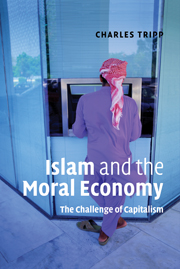4 - Islamic economics and Islamic banks
Published online by Cambridge University Press: 08 January 2010
Summary
The record of state direction of the national economy in much of the Arab Islamic world had not been a happy one. By the early 1970s, it was clear that only in oil-producing countries such as Iraq, Algeria or Libya could the immense revenue flow sustain the kind of welfare state promised by state ownership of the means of production. Elsewhere, and in certain sectors in these countries as well, state control of the economy had led to a fall in productivity, underemployment and an inability to boost either the volume or the terms of trade with the rest of the world. The vision of a just and effective alternative to capitalism, whether presented as secular or Islamic socialism, appeared to be wearing thin, both in the Islamic world and beyond, throwing into doubt many of the assumptions upon which an alternative global economic order had been based. At the same time, it had become clear to many Muslim intellectuals that, gratifying as it may have been to have seen their ideas taken up by a state as powerful as that of Nasser's Egypt, they and the values they espoused had paid a price which entailed the subordination of their cause to the dictates of a state guided not by Islamic principles, but by those of secular nationalism and authoritarian populism.
- Type
- Chapter
- Information
- Islam and the Moral EconomyThe Challenge of Capitalism, pp. 103 - 149Publisher: Cambridge University PressPrint publication year: 2006



